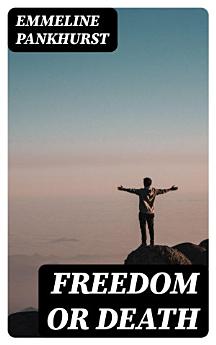Freedom or death
Emmeline Pankhurst
2022 മേയ് · DigiCat
ഇ-ബുക്ക്
35
പേജുകൾ
family_home
യോഗ്യതയുണ്ട്
info
reportറേറ്റിംഗുകളും റിവ്യൂകളും പരിശോധിച്ചുറപ്പിച്ചതല്ല കൂടുതലറിയുക
ഈ ഇ-ബുക്കിനെക്കുറിച്ച്
In "Freedom or Death," Emmeline Pankhurst delivers a powerful call to action for women's suffrage, articulating the struggles of the early 20th-century feminist movement in Britain. With a passionate and evocative prose style, Pankhurst interweaves personal anecdotes and political rhetoric, highlighting the moral imperative of women's rights. The text serves not only as a historical document but also as a timeless manifesto that challenges societal norms, underscoring the urgent need for equality and justice in a world defined by patriarchy. The book's context, emerging from a backdrop of political unrest and the rise of radical activism, provides a profound lens through which to view the fight for suffrage as not just a women's issue, but a broader human rights struggle. Emmeline Pankhurst (1858-1928) was a pioneering suffragette whose activism was shaped by her upbringing in a politically conscious household and her subsequent experiences in the women's movement. Her experiences, including imprisonment for her beliefs and her leadership of the Women's Social and Political Union, shaped her resolute stance on militancy as a necessary strategy for change. Pankhurst's unwavering determination is a testament to her character, making her a formidable figure in the history of social justice. "Freedom or Death" is not merely a historical account; it is an impassioned appeal that resonates with contemporary audiences. Scholars, activists, and anyone interested in social justice will find Pankhurst's insights invaluable. This book is a reminder of the sacrifices made for progress and serves as a guide for those who continue to fight for equality today.
രചയിതാവിനെ കുറിച്ച്
Emmeline Pankhurst (1858-1928) stands as a towering figure in the annals of social and political activism, particularly in the women's suffrage movement in the United Kingdom. Born Emmeline Goulden into a politically active family, Pankhurst was instilled with a passion for social equality from an early age. She married Richard Pankhurst, a barrister known for supporting women's right to vote. Together, they were powerful advocates for suffrage before his untimely death left Emmeline to continue their work. Pankhurst's fervent dedication to the cause of female enfranchisement led her to found the Women's Social and Political Union (WSPU) in 1903, which adopted more militant tactics than previously seen in the suffrage movement. As a strategist, orator, and leader, Pankhurst's influence was profound and far-reaching. Her resolve is encapsulated in the speech 'Freedom or Death,' delivered in 1913 in Hartford, Connecticut, which later was published and remains a touchstone for activists championing civil liberties. Pankhurst's literary output, while scant, is profoundly impactful, reinforcing her role not just as a campaigner but also as a compelling voice in the written advocacy of women's rights. Her stylistic approach combined potent rhetoric with heartfelt appeals, aimed to galvanize supporters and sway opponents to the cause of women's suffrage. Her legacy is a testament to the power of tireless advocacy and remains influential in discourses on gender equality and civil rights.
ഈ ഇ-ബുക്ക് റേറ്റ് ചെയ്യുക
നിങ്ങളുടെ അഭിപ്രായം ഞങ്ങളെ അറിയിക്കുക.
വായനാ വിവരങ്ങൾ
സ്മാർട്ട്ഫോണുകളും ടാബ്ലെറ്റുകളും
Android, iPad/iPhone എന്നിവയ്ക്കായി Google Play ബുക്സ് ആപ്പ് ഇൻസ്റ്റാൾ ചെയ്യുക. ഇത് നിങ്ങളുടെ അക്കൗണ്ടുമായി സ്വയമേവ സമന്വയിപ്പിക്കപ്പെടുകയും, എവിടെ ആയിരുന്നാലും ഓൺലൈനിൽ അല്ലെങ്കിൽ ഓഫ്ലൈനിൽ വായിക്കാൻ നിങ്ങളെ അനുവദിക്കുകയും ചെയ്യുന്നു.
ലാപ്ടോപ്പുകളും കമ്പ്യൂട്ടറുകളും
Google Play-യിൽ നിന്ന് വാങ്ങിയിട്ടുള്ള ഓഡിയോ ബുക്കുകൾ കമ്പ്യൂട്ടറിന്റെ വെബ് ബ്രൗസർ ഉപയോഗിച്ചുകൊണ്ട് വായിക്കാവുന്നതാണ്.
ഇ-റീഡറുകളും മറ്റ് ഉപകരണങ്ങളും
Kobo ഇ-റീഡറുകൾ പോലുള്ള ഇ-ഇങ്ക് ഉപകരണങ്ങളിൽ വായിക്കാൻ ഒരു ഫയൽ ഡൗൺലോഡ് ചെയ്ത് അത് നിങ്ങളുടെ ഉപകരണത്തിലേക്ക് കൈമാറേണ്ടതുണ്ട്. പിന്തുണയുള്ള ഇ-റീഡറുകളിലേക്ക് ഫയലുകൾ കൈമാറാൻ, സഹായ കേന്ദ്രത്തിലുള്ള വിശദമായ നിർദ്ദേശങ്ങൾ ഫോളോ ചെയ്യുക.







